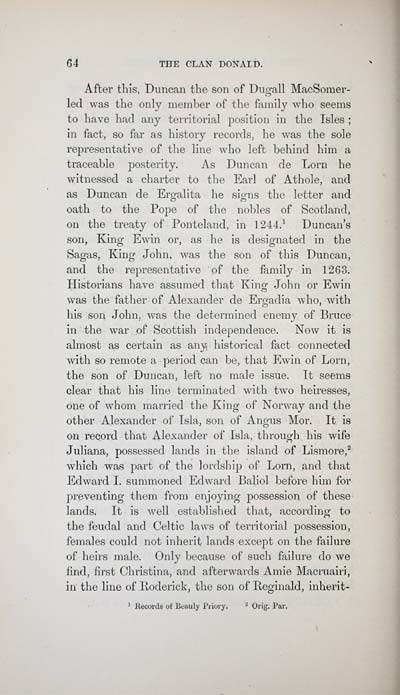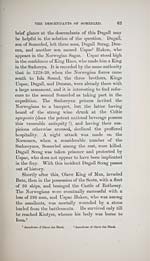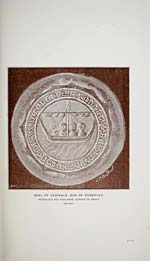Matheson Collection > Clan Donald > Volume 1
(100)
Download files
Complete book:
Individual page:
Thumbnail gallery: Grid view | List view

G4 THE CLAN DONALD.
After this, Duncan the son of Dngall MacSomer-
led was the only member of the family who seems
to have had any territorial position in the Isles ;
in fact, so far as history records, he was the sole
representative of the line who left behind him a
traceable posterity. As Duncan de Lorn he
witnessed a charter to the Earl of Athole, and
as Duncan de Ergalita he signs the letter and
oath to the Pope of the nobles of Scotland,
on the treaty of Ponteland, in 1244.^ Duncan's
son, King Ewin or, as he is designated in the
Sagas, King John, was the son of this Duncan,
and the representative of the family in 1263.
Historians have assumed that King John or Ewin
was the father of Alexander de Ergadia who, with
his son John, was the determined enemy of Bruce
in the war of Scottish independence. Now it is
almost as certain as any historical fact connected
with so remote a period can be, that Ewin of Lorn,
the son of Duncan, left no male issue. It seems
clear that his line terminated with two heiresses,
one of whom married the King of Norway and the
other Alexander of Isla, son of Angus Mor. It is
on record that Alexander of Isla, through his wife
Juliana, possessed lands in the island of Lismore,*^
which was part of the lordship of Lorn, and that
Edward I. summoned Edward Baliol before him for
preventing them from enjoying possession of these
lands. It is well established that, according to
the feudal and Celtic la\A'S of territorial possession,
females could not inherit lands except on the failure
of heirs male. Only because of such failure do we
find, first Christina, and afterwards Amie Macruairi,
in the line of Iloderick, the son of Reginald, inherit-
' Itecords of Bcauly Piiory. ^ Orig. Par.
After this, Duncan the son of Dngall MacSomer-
led was the only member of the family who seems
to have had any territorial position in the Isles ;
in fact, so far as history records, he was the sole
representative of the line who left behind him a
traceable posterity. As Duncan de Lorn he
witnessed a charter to the Earl of Athole, and
as Duncan de Ergalita he signs the letter and
oath to the Pope of the nobles of Scotland,
on the treaty of Ponteland, in 1244.^ Duncan's
son, King Ewin or, as he is designated in the
Sagas, King John, was the son of this Duncan,
and the representative of the family in 1263.
Historians have assumed that King John or Ewin
was the father of Alexander de Ergadia who, with
his son John, was the determined enemy of Bruce
in the war of Scottish independence. Now it is
almost as certain as any historical fact connected
with so remote a period can be, that Ewin of Lorn,
the son of Duncan, left no male issue. It seems
clear that his line terminated with two heiresses,
one of whom married the King of Norway and the
other Alexander of Isla, son of Angus Mor. It is
on record that Alexander of Isla, through his wife
Juliana, possessed lands in the island of Lismore,*^
which was part of the lordship of Lorn, and that
Edward I. summoned Edward Baliol before him for
preventing them from enjoying possession of these
lands. It is well established that, according to
the feudal and Celtic la\A'S of territorial possession,
females could not inherit lands except on the failure
of heirs male. Only because of such failure do we
find, first Christina, and afterwards Amie Macruairi,
in the line of Iloderick, the son of Reginald, inherit-
' Itecords of Bcauly Piiory. ^ Orig. Par.
Set display mode to: Large image | Transcription
Images and transcriptions on this page, including medium image downloads, may be used under the Creative Commons Attribution 4.0 International Licence unless otherwise stated. ![]()
| Early Gaelic Book Collections > Matheson Collection > Clan Donald > Volume 1 > (100) |
|---|
| Permanent URL | https://digital.nls.uk/76681266 |
|---|
| Description | Volume 1. |
|---|---|
| Attribution and copyright: |
|
| Description | Genealogy. (Library only has two volumes of three at this shelf mark.) |
|---|---|
| Shelfmark | Mat.165-6 |
| Additional NLS resources: |
| Description | Items from a collection of 170 volumes relating to Gaelic matters. Mainly philological works in the Celtic and some non-Celtic languages. Some books extensively annotated by Angus Matheson, the first Professor of Celtic at Glasgow University. |
|---|
| Description | Selected items from five 'Special and Named Printed Collections'. Includes books in Gaelic and other Celtic languages, works about the Gaels, their languages, literature, culture and history. |
|---|

